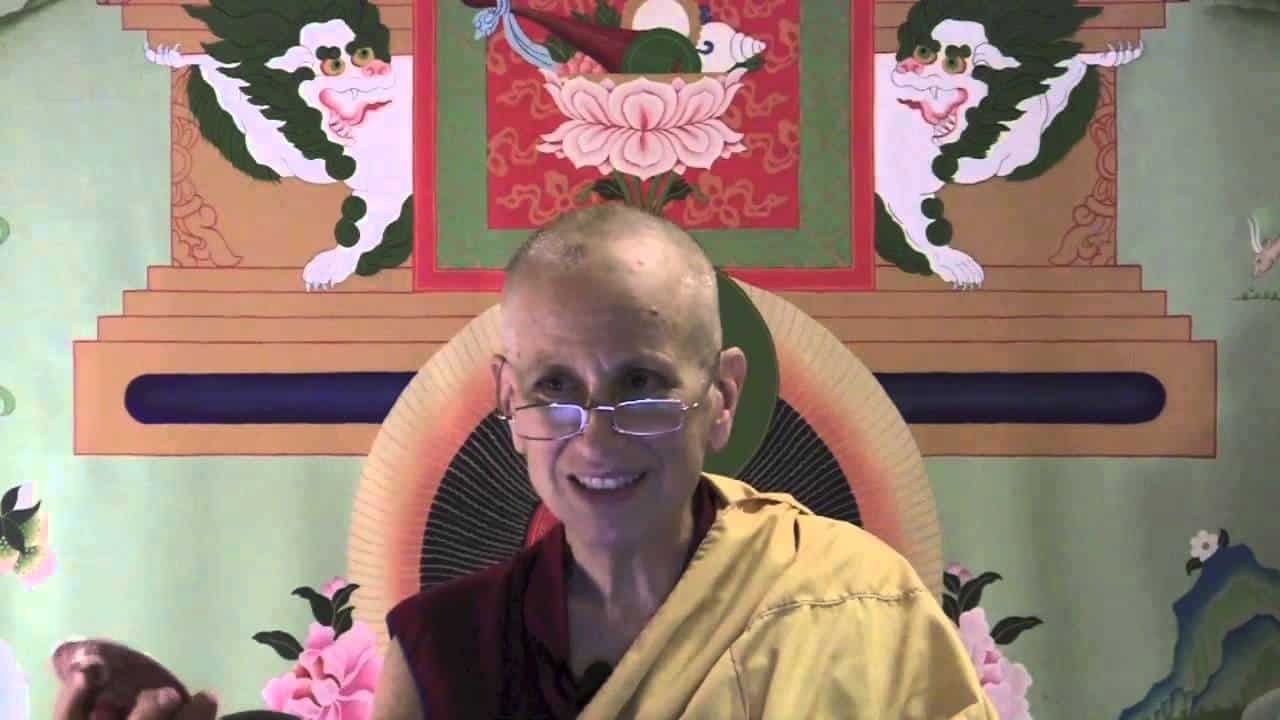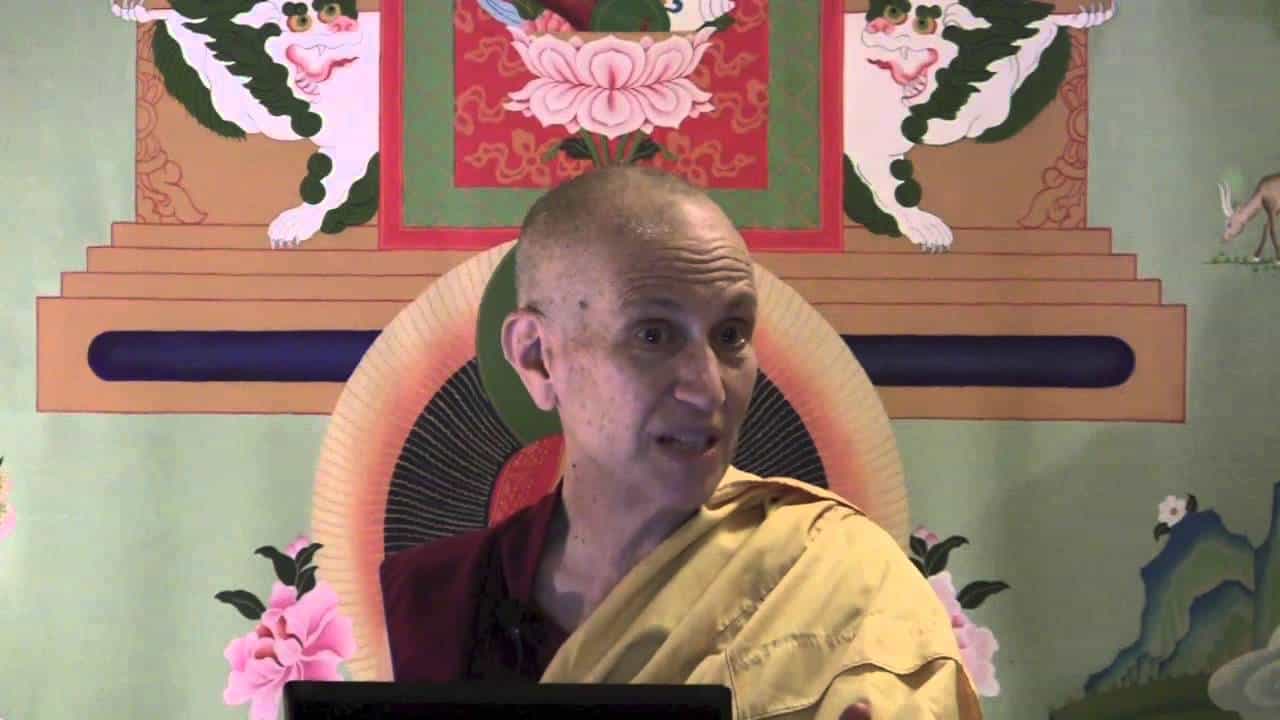Verse 69: The best speaker of all
Part of a series of talks on Gems of Wisdom, a poem by the Seventh Dalai Lama.
- The importance of listening to the Dharma
- Taking advantage of opportunities to listen to live teachings
- Combining the whole process of hearing, thinking, and meditating, especially if we want to teach others
Gems of Wisdom: Verse 69 (download)
Who is the best speaker of all those strong beings?
He (or she) who has listened closely to a vast range of awakening lore.
Strong beings means strong in the Dharma. Somebody who’s able to really express the Dharma well so that others can understand it and gain some experience from what they’re hearing. So, “Who’s the best speaker?” Well, clearly the Buddha. But aside from the Buddha, “those who have listened closely to a vast range….” Here it has “of enlightenment lore.” I would say “of teachings.” Because teachings aren’t “lore.” Are they?
This verse really emphasizes the importance of listening to teachings. So we always have the three things: listening (which is sometimes including studying and reading), reflecting (contemplating or thinking about), and then third, meditating. So the minimum requirement for being able to express the Dharma and teach the Dharma is having heard a lot of teachings oneself. Now, we could say, “having studied a lot of teachings oneself.” However, I’m really understanding why they often say “hear.” Of course it means after you hear you study and you read. But I think the hearing—in a direct experience with a living teacher—is really important. That if you don’t make an effort to attend teachings with a real, live teacher in a group of real, live people, but you only learn and study, then you don’t get the full experience.
Of course, if you live in Timbuktu and there’s nobody to study from, of course you go online, you read, you do whatever you possibly can. But, when you have the opportunity, listening to teachings and having a relationship with a teacher is something that cannot be replaced by reading or studying only. But like I said, after you hear the teachings then you go back, you read the texts. Or you read the text before you study the teaching because then you know a little bit about it and you can understand the teaching better. But you combine that whole process of learning through hearing, reading, and studying.
And that’s really important if one wants to teach or to give Dharma talks. Sometimes people are really eager, like, “I want to be a Buddhist teacher.” And, “I want to help sentient beings by being a Buddhist teacher.” But the thing is, we have to make ourselves into qualified teachers. Otherwise we become a mess. And if we teach things inaccurately, if we mislead people on the path, not only is it very heavy karma ourselves, but it’s very damaging to the people that we teach.
Sometimes they think, “Oh, just your first elementary person who gives you the general Buddhist talk and teaches you meditation, that person can kind of be anybody.” But I really notice that people listen and they remember the first things they’re taught about a subject. And if they learn those first things incorrectly, then when they hear the correct thing they often have resistance to it. “Oh, but my first teacher said blah blah.” And it’s really hard to convince them that that person didn’t know it very well, or expressed it incorrectly. Or even that the person him or herself misheard it. You know, lots of time we listen to things and we don’t hear the teachings properly, and we don’t remember the teachings properly. So it can come from anywhere. But as much as possible, that people really learn correctly.
We can see that within ourselves, can’t we, what happens when we kind of learn something incorrectly—which could happen, like I said, because we don’t study it and we just remember half of this sentence and half of that sentence and put it together to mean a third sentence which was not what the teacher said at all. And that happens all the time. People will come up to me after a talk and, “you said blah blah.” And I go, “Really? Listen to the recording, I never say that.” But people remember things. And so it’s important as much as possible from our side to help them remember things correctly.
They always talk about hearing teachings as, kind of like, gathering a bunch of jewels, or receiving a bunch of jewels, because when you have a lot of teachings then no matter where you are in your life you have a lot to think about and a lot to meditate on. And so I think here about the people in Tibet after 1959 who were thrown in prison, and they weren’t allowed to even move their lips saying mantra or anything like that. But the people who had studied and had heard teachings and had memorized the texts then it was fine. They just sat there and recited their texts and contemplated their texts and meditated on all the teachings they had heard, and it was fine. That Dharma can never ever be taken away from them. Whereas if we haven’t studied then if we get in a difficult situation we don’t have anything to draw on if we can’t get to the book or get to the computer and we can’t remember anything ourselves. So hearing teachings is really important.
Of course, that’s not the only thing. We also have to think about them and discuss them, because that’s how we refine our understanding and make sure that we really understood correctly. And then after we have the correct understanding, then when we meditate, we can have some experience, when we’re also doing purification and collection of merit to ripen our minds. All those kinds of activities then will make us a “strong being.” Or a best speaker.
They also say…. Especially if somebody has all three—hearing, thinking, and meditating—and so they have realizations, then when they speak, even if they just say a little bit it really goes in, by the power of their speech, because they’re speaking from personal experience. They’re not telling you theory. They’re telling you, kind of, how it is. And so that’s why they say that somebody who’s a bodhisattva, who has generated bodhicitta, of course they have realizations of many of the Dharma topics, so when that person teaches it’s like it’s very powerful because they’re speaking from their personal experience. They’re not just teaching theory and lists and stuff like that.
The more we go in that direction, the better we’re going to be in terms of really being of benefit to others. And the more we’re going to benefit ourselves. Because it’s so really crucial to practice what we teach. If we don’t practice it then what in the world are we doing?
[In response to audience] But even if you just have a little experience with something, you know? Because you’ve really made it part of yourself then when you say that to others it becomes meaningful to them. It’s not just intellectual blah blah blah.
This, I think, is the difference between somebody who learns Buddhism in an academic setting but never practices, versus somebody who practices. They may still learn Buddhism in an academic setting, but they also practice, and that makes a huge difference. And of course, if you listen to the teachings from a lineage of practitioners you’re going to get a whole different experience than if you listen from people who are just studying a topic out of academic interest. Because somebody who is studying it because they practice it, because it’s meaningful to them in their lives, because they have some belief in it, then it’s meaningful to that person. It’s not just kind of like relating the characteristics of a car, you know? Or something like that.
[In response to audience] Oh, yes. From all the visiting teachers—of course, you don’t learn that from your resident teacher. [laughter] But from all the visiting teachers it’s very useful to learn from how they live their lives and observing them and everything.
You should have seen her with Geshe Thabkhe. Did you notice her? She was the perfect model nun. Eyes down, so serene, so peaceful. Carrying his book. Walking slowly and mindfully. She was perfect with Geshe Thabkhe.
[In response to audience] Yes, you were like that in the early days when you first met me. Now it’s like…. They often say when you stay around a teacher a lot you have to be careful because your behavior becomes quite sloppy.
[In response to audience] Yes, so what Geshe Jampa Tegchok said, yes, fine to be an academic, but that’s not…. If you’re going to teach in a Buddhist center to people who want to practice then you really need to have practice, and belief, and faith yourself.
Venerable Thubten Chodron
Venerable Chodron emphasizes the practical application of Buddha’s teachings in our daily lives and is especially skilled at explaining them in ways easily understood and practiced by Westerners. She is well known for her warm, humorous, and lucid teachings. She was ordained as a Buddhist nun in 1977 by Kyabje Ling Rinpoche in Dharamsala, India, and in 1986 she received bhikshuni (full) ordination in Taiwan. Read her full bio.


